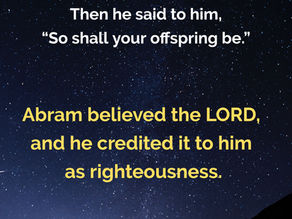Galatians 3:10-14 - Law / Gospel
- Chad Werkhoven
- Jan 30, 2024
- 3 min read
The Bible has two distinct parts, and you need to know them both!

Galatians 3:10–14 (NIV)
10 For all who rely on the works of the law are under a curse, as it is written: “Cursed is everyone who does not continue to do everything written in the Book of the Law.” 11 Clearly no one who relies on the law is justified before God, because “the righteous will live by faith.” 12 The law is not based on faith; on the contrary, it says, “The person who does these things will live by them.” 13 Christ redeemed us from the curse of the law by becoming a curse for us, for it is written: “Cursed is everyone who is hung on a pole.” 14 He redeemed us in order that the blessing given to Abraham might come to the Gentiles through Christ Jesus, so that by faith we might receive the promise of the Spirit. |
Listen to passage & devotional:
Belgic Confession of Faith, Article 4: The Canonical Books
This week we'll be focusing on some of the different literary genres included in the Bible: Narrative, poetry/wisdom, the epistles, and apocalyptic. Today we're going to look at the primary distinction in the Bible: the difference between law & gospel.
We include in the Holy Scripture the two volumes
of the Old and New Testaments.
They are canonical books
with which there can be no quarrel at all.
In the church of God the list is as follows:
In the Old Testament,
the five books of Moses—
Genesis, Exodus, Leviticus, Numbers, Deuteronomy;
the books of Joshua, Judges, and Ruth;
the two books of Samuel, and two of Kings;
the two books of Chronicles, called Paralipomenon;
the first book of Ezra; Nehemiah, Esther, Job;
the Psalms of David;
the three books of Solomon—
Proverbs, Ecclesiastes, and the Song;
the four major prophets—
Isaiah, Jeremiah, Ezekiel, Daniel;
and then the other twelve minor prophets—
Hosea, Joel, Amos, Obadiah,
Jonah, Micah, Nahum, Habakkuk,
Zephaniah, Haggai, Zechariah, Malachi.
In the New Testament,
the four gospels—
Matthew, Mark, Luke, and John;
the Acts of the Apostles;
the fourteen letters of Paul—
to the Romans;
the two letters to the Corinthians;
to the Galatians, Ephesians, Philippians, and Colossians;
the two letters to the Thessalonians;
the two letters to Timothy;
to Titus, Philemon, and to the Hebrews;
the seven letters of the other apostles—
one of James;
two of Peter;
three of John;
one of Jude;
and the Revelation of the apostle John.
Summary
Today's passage begins with a harsh reality: "all who rely on the works of the law are under a curse (v10)." In other words, if your plan to get right with God involves you just doin' a bit better or tryin' a bit harder to follow God's laws and commands, you're "cursed." The problem is that if you're going to put your hope in the law, then you must "continue to do everything written in the Book of the Law" (v10b, which is a direct quote from Deuteronomy 27:26). 'Almost' doesn't count, and you don't get extra credit for having good intentions. Your law keeping must be perfect to please our perfect Lawgiver.
Often times the word 'gospel' is understood to mean one of the four accounts of Jesus' life found at the beginning of the New Testament. But in a much bigger sense, the word 'gospel' refers to primary message of the Bible, which is summarized in v13: "Christ redeemed us from the law by becoming a curse for us."
This means that your eternal destiny is no longer determined by how well (or poorly) you do following God's law. In sacrificing His own life, Christ purchased you so that you would "receive the promise of the Spirit (v14)" rather than the curse you deserve.
Dig Deeper
If you were to ask most people what the two principle parts of the Bible are, they'd likely indicate the Old and New Testaments. While this is true in an organizational sense, there's an even bigger division that can be made.
In theology, we call this the law / gospel distinction. Either a passage is making clear what God's expectations for you are, and thereby pronouncing a curse on you since you haven't perfectly met those expectations, or it's proclaiming the wonderful good news that you've been redeemed from the curse of the law through faith in Jesus.
It's tempting to just focus on the good news. Why bother being reminded of failure and curses when you could just focus on the gift of salvation that Christ provides? Since it seems like the Old Testament is nothing but a catalog of failure, why not just focus on the good news proclaimed in the New Testament?
For one thing, the Old Testament is full of the gospel! Notice how every line of today's very gospel-intense passage is either an allusion to or a direct quote from the Old Testament. Plus, just as there's lots of gospel in the Old Testament, there's a good share of law in the New Testament.
As a recipient of the gospel, make sure you keep a tight grip on God's Law. You need it. By reminding you of God's unchanging, perfectly righteous requirement, the law keeps you clinging to Christ. And striving to keep God's law is the primary way that you can show your gratitude for the redemption you have in Christ Jesus as you live by faith.
ACKNOWLEDGE WHO GOD IS: Our Father God, whose Law is perfect;
ALIGN YOUR LIFE WITH GOD'S WILL: Thank God for His Law, and pray that you will keep it as you live by faith in Christ, who met its requirements for you;
ASK GOD FOR WHAT YOU NEED:
Read the New Testament in a year! Today: Acts 6



















Comments